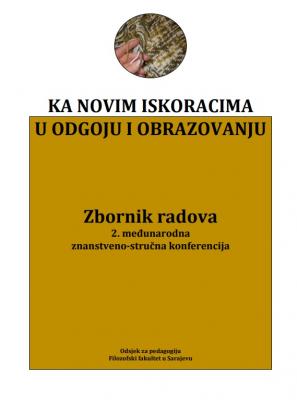DIMENZIJE VASPITNE KLIME U CRNOGORSKIM PREDŠKOLSKIM USTANOVAMA
DIMENSIONS OF EDUCATIONAL CLIMATE IN PRESCHOOL INSTITUTIONS IN MONTENEGRO
Author(s): Tatjana Novović, Veselin MićanovićSubject(s): Preschool education, State/Government and Education, Inclusive Education / Inclusion, Sociology of Education, Pedagogy
Published by: Filozofski fakultet Univerziteta u Sarajevu
Keywords: educational climate; ambient; children; preschool teachers; parents;
Summary/Abstract: The paper presents the dimensions of the educational climate in preschool institutions in Montenegro. In addition to the structural dimensions which describe the work environment of preschool institutions, more specific, complex and difficult to describe formative aspects of the educational environment could be extracted, which determine the climate or atmosphere in children’s institutions. Educational climate is of particular importance for the quality of educational work in preschool institutions, which is described by Freiberg as “the heart and soul of the school” (Đorđić, Damjanović, 2014: 303). As key constitutive dimensions of the educational climate / environment in preschool institutions, we pointed out: strategies for learning / teaching, relevance of topics which teachers implement with children, family and community participation, openness and inclusiveness of environment for learning. The aim of the research is to determine to what extent and in what way, having the assumed dimensions of the educational climate as a baseline, preschool teachers create an environment which is functional for children needs in preschool institutions in Montenegro. The paper used the evaluation method, with elements of qualitative approach. For the purpose of reviewing the quality of the educational climate in current preschool context purposefully structured instruments have been used: group interviews with teachers, a survey for parents. Research findings show that teachers use different methodological strategies in the work, adapt themes to children’s interests, cooperate with parents, but in the ingrained traditional way, through parent meetings and individual exchange of knowledge. Replies of respondents indicate to lack of more committed and active involvement of parents and communities in the pedagogical process and creating the overall educational climate in preschool institution.
Journal: Zbornik radova Odsjeka za pedagogiju
- Issue Year: 2/2018
- Issue No: 2
- Page Range: 268-279
- Page Count: 12
- Language: Montenegrine

